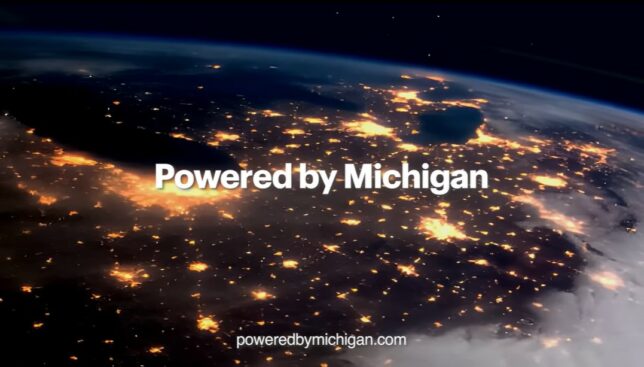Green Watch
Michigan Renewable Energy Ads Tied to Arabella Advisors Network


Residents of Michigan, wanting nothing more than to spend their weekends watching a historic season of Michigan football (historically good for the Lions and Wolverines, historically bad for the Spartans) have found themselves bombarded by ads from a mysterious group calling itself “Powered by Michigan.”
The ads are overflowing with the secret dialect of Michiganders, warming up to the audience by discussing the difference between “yoopers” and “trolls” and showing friendly grandmothers using their hand as a map. The warm and fuzzy local color doesn’t last long, though. The ads end with the bait-and-switch message that many Michiganders “may not know” that “this” (a shot of a field of solar panels or wind turbines) “powers this” (an overhead view of Ford Field or a shot of a school bus). Finally, the ads all feature a call to action encouraging voters to “demand more homegrown clean energy now.”
Powered by Michigan certainly sounds like the name of a grassroots Michigan activist group, but skeptical voters wanting to know more might visit the website featured in the ads: poweredbymichigan.com. Scrolling to the bottom, one can find the “About Us” page featuring a mission statement and the logo of the Michigan League of Conservation Voters Education Fund with the words “Please join us” inscribed above it.
“Okay, Powered by Michigan might not be exactly what it seems,” the skeptical Michigander might conclude, “but it is, at least, the project of a real grassroots Michigan group that I know.”
The skeptical Michigander would be wrong, though.
Ties to Arabella Advisors
Powered by Michigan isn’t from Michigan at all, even though its website says, “If we Michiganders [emphasis added] put our minds to it, we can achieve our goal of getting 60% of our electricity from clean energy.” The website’s privacy policy, which the average person would never check, reveals that Powered by Michigan has nothing to do with the Michigan League of Conservation Voters and is actually a project of a little known group called the Potential Energy Coalition.
The Potential Energy Coalition is now based out of a New York City high-rise, and it was started as a project of a nonprofit called the Windward Fund. The Windward Fund is a wing of the infamous Arabella Advisors network, a group of politicized nonprofits controlled by the for-profit Arabella Advisors.
Arabella Advisors is a consulting firm based in Washington, DC, that specializes in obscuring the original source of large donations by incubating “fiscally sponsored” pop-up activist groups that don’t actually exist on paper and thus have no disclosures. From 2020 to 2021, the Arabella Advisors network raised $3.4 billion. One of Arabella’s specialties is creating pop-up projects that pose as grassroots activists groups, or even local newspapers, to push a specific agenda for its mystery donors.
The Potential Energy Coalition’s Form 990 says that the group separated from the Windward Fund and became an independent organization as far back as 2018, but the relationship between the two remains strong to this day. Since 2020 the Windward Fund has paid the Potential Energy Coalition nearly $2 million for “consulting services” and granted them $4.5 million.
Major donors to the Windward Fund also seem to be under the impression that the Potential Energy Coalition is still controlled by Windward. In 2021, the Sequoia Climate Fund, a private foundation of mysterious hedge fund billionaire Charles Frederick Taylor, contributed $4 million to the Windward Fund in 2021, labeling the grant’s purpose as “Potential Energy Coalition.” The William and Flora Hewlett Foundation did the same, granting a whopping $7 million to Windward since 2019 with the grant descriptions mentioning the Potential Energy Coalition as well. The Hewlett Foundation is well-known for its hatred of capitalism and support for socialist causes.
Big-Money Donors
Other donors to the Potential Energy Coalition, through Windward or directly, include the Silicon Valley Community Foundation ($5 million), the Grantham Foundation for the Protection of the Environment ($750,000), the Skoll Fund ($1 million), the Arthur Vining Davis Foundations ($1 million), the Rockefeller Brothers Fund ($1 million), and the Wallace Global Fund ($100,000).
These donors have a few things in common.
First, none of them have anything to do with the state of Michigan. Second, several of these donors have large investments in the green energy sector. Jefferey Skoll, billionaire patron of the Skoll Fund, is the founder of Capricorn Investment group, a venture capital firm that operates a “sustainable investors fund” focused on “climate change mitigation.” Jeremy Grantham, creator of the Grantham Foundation for the Protection of the Environment, is the British co-founder of Grantham, Mayo, Van Otterloo & Co., a prominent ESG (environmental, social, and corporate governance) investing firm that owns millions of shares of stock in solar energy and bio-fuel companies, some with operations near Michigan around the Midwest and Canada.
Distorting the Facts
Despite all the money that the Potential Energy Coalition brings in (or perhaps because it) the group doesn’t seem to have its facts straight. The ads it has been running all over Michigan seem to suggest that solar and wind are such a substantial part of Michigan’s power grid that they can single-handedly power things like Ford Field and electric school bus fleets. That’s just not true.
According to the U.S. Energy Information Administration, just 12 percent of Michigan’s net electricity generation in 2022 came from renewable energy like wind and solar. Data from June 2023 show that the vast majority of Michigan’s electricity comes from natural gas, coal, and nuclear power plants. Meanwhile, energy policy experts are warning that the small part of Michigan’s power grid that does depend on renewables is unreliable, placing the state’s electricity supply at serious risk.
Clearly, Powered by Michigan is not what it claims to be. In fact, Powered by DC might be a more fitting name. Whatever the group is trying to sell on behalf of its ESG-investing donors; Michiganders should not buy it.



